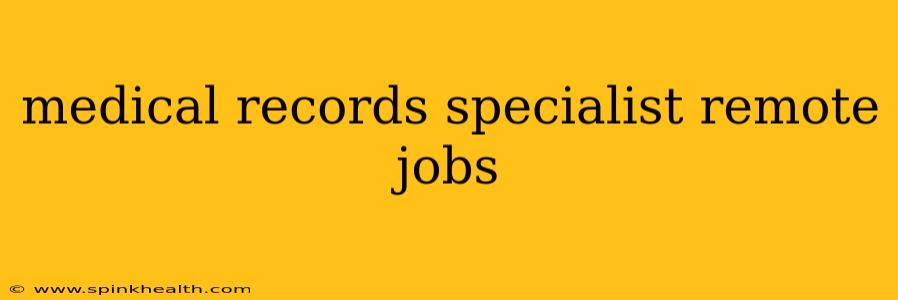Charting a New Course: Your Guide to Remote Medical Records Specialist Jobs
The world of healthcare is transforming, and with it, the opportunities for medical records specialists. No longer confined to sterile office spaces, many professionals are finding fulfilling careers as remote medical records specialists. This isn't just a trend; it's a revolution, opening doors to flexibility, work-life balance, and a wider range of career paths. But navigating this new landscape requires understanding the nuances of the field. Let's delve into the exciting world of remote medical records specialist jobs.
Imagine this: You're sipping your morning coffee, the sun streaming through your window, and you're already halfway through your daily tasks, ensuring patient data is meticulously organized and secure. This is the reality for many medical records specialists who have embraced remote work. This guide will help you understand the opportunities, challenges, and essential skills needed to thrive in this increasingly popular career path.
What are the Responsibilities of a Remote Medical Records Specialist?
A remote medical records specialist's duties mirror those of their on-site counterparts, but with the added layer of remote work logistics. Their core responsibilities revolve around the accuracy, accessibility, and security of patient health information. This includes:
- Maintaining Patient Records: This is the bread and butter of the job, involving accurate data entry, updating patient charts, and ensuring all information is complete and compliant with HIPAA regulations.
- Coding and Billing Support: Many remote roles involve assisting with medical coding and billing, requiring a strong understanding of medical terminology and billing procedures.
- Record Retrieval and Release: This often involves responding to requests for patient information, ensuring compliance with release-of-information protocols.
- Data Entry and Management: Using electronic health record (EHR) systems is crucial, requiring proficiency in different software applications.
- Quality Control and Audits: Regularly reviewing records for accuracy and completeness is essential, often involving internal audits to maintain data integrity.
What skills do I need to become a successful remote medical records specialist?
Beyond the technical skills, several soft skills are crucial for success in this remote environment:
- Exceptional organizational skills: Managing multiple tasks remotely requires excellent organization and time management.
- Strong attention to detail: Accuracy is paramount in medical records; any error can have serious consequences.
- Proficiency with EHR software: Familiarity with common EHR systems (Epic, Cerner, etc.) is a must.
- Excellent communication skills: Clear and concise communication, both written and verbal, is vital for collaborating with colleagues and handling patient information requests.
- Adaptability and self-motivation: Working remotely demands self-discipline and the ability to adapt to changing situations.
- Technical proficiency: A solid understanding of computer systems, internet security, and remote work tools is essential.
What qualifications are typically required for these jobs?
While specific requirements vary, most remote medical records specialist roles require:
- High school diploma or equivalent: This is typically the minimum requirement.
- Associate's or Bachelor's degree in health information management (HIM) or a related field: A higher education degree is often preferred, especially for advanced roles.
- Certified Medical Records Technician (CMRT) or Registered Health Information Technician (RHIT) certification: These certifications demonstrate competency and increase your marketability.
- Experience with EHR software: Demonstrable experience with various EHR systems is highly valued.
Where can I find remote medical records specialist jobs?
Finding the right remote role involves leveraging various resources:
- Online job boards: Sites like Indeed, LinkedIn, Monster, and Glassdoor often list remote medical records specialist positions.
- Company websites: Check the career pages of healthcare organizations that offer remote work opportunities.
- Networking: Connecting with professionals in the field can lead to unadvertised openings.
- Freelance platforms: Some freelance platforms may list short-term or project-based medical records specialist assignments.
What are the advantages and disadvantages of working as a remote medical records specialist?
Advantages:
- Flexibility and work-life balance: Set your own hours and work from anywhere with a reliable internet connection.
- Reduced commute time and costs: Save time and money by eliminating daily commutes.
- Increased job satisfaction: Many find remote work enhances job satisfaction due to increased autonomy and flexibility.
Disadvantages:
- Isolation and loneliness: Working remotely can sometimes lead to feelings of isolation.
- Technological challenges: Reliable internet access and technical support are crucial.
- Difficulties with collaboration: Effective communication and collaboration are essential to overcome the challenges of remote work.
The journey to becoming a successful remote medical records specialist is paved with opportunity. With the right skills, qualifications, and a proactive approach to job searching, you can chart your own course toward a rewarding and flexible career. Remember that the demand for skilled remote medical records specialists is growing, and with dedication and perseverance, your future in this dynamic field is bright.

